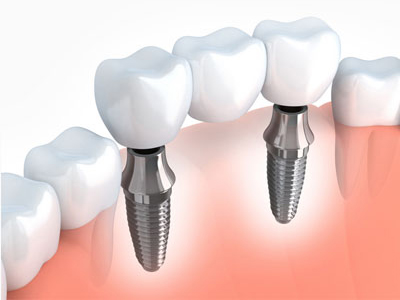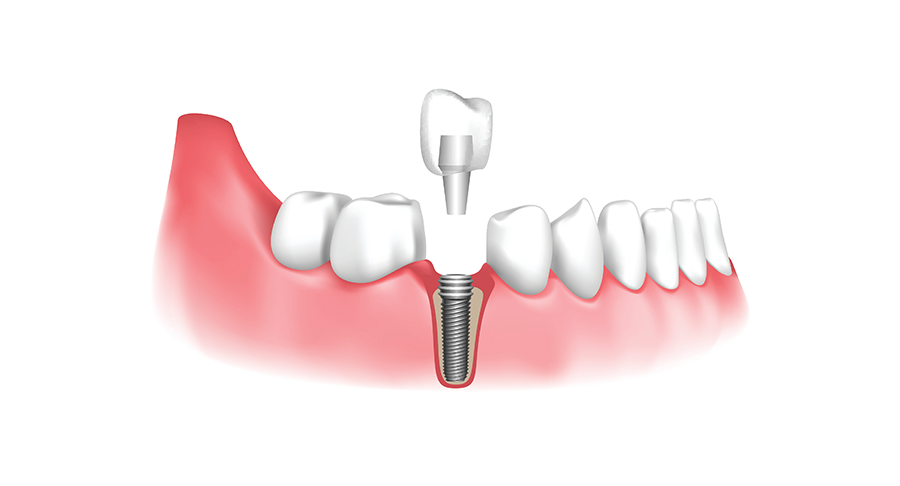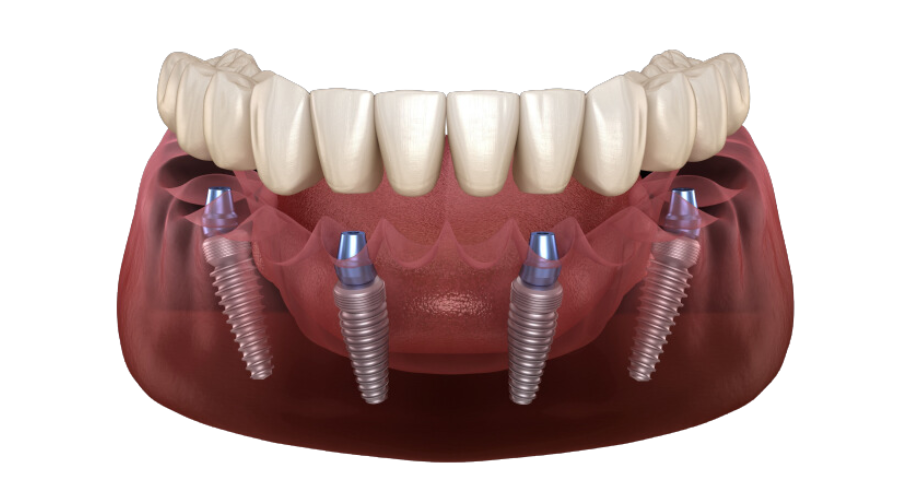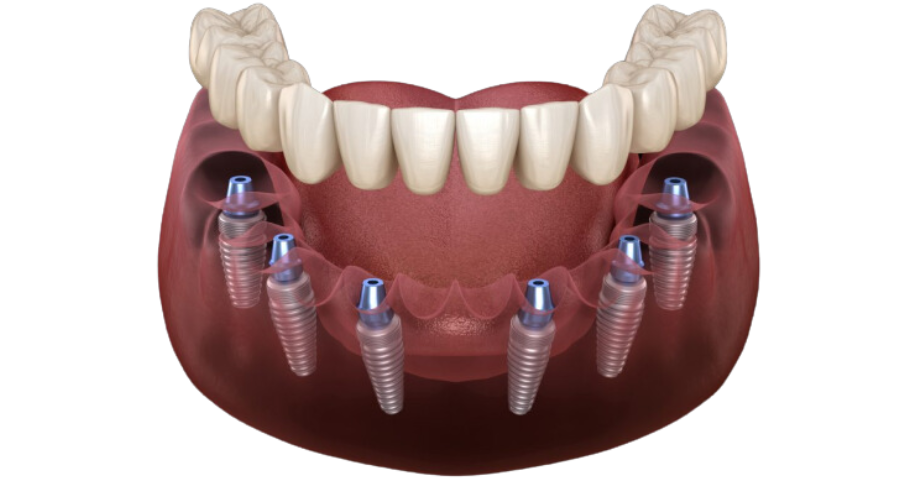On this Page ↓
What are Dental Implants?
 Dental implants (or teeth implants) are easily the most popular and ideal solution for replacing missing teeth. They have changed the course of dentistry in the last quarter of a century or so.
Dental implants (or teeth implants) are easily the most popular and ideal solution for replacing missing teeth. They have changed the course of dentistry in the last quarter of a century or so.
A Dental Implant (or teeth implant) is a titanium post or screw which is surgically inserted into the jawbone beneath the gum line to work as a tooth root. Post insertion, an implantologist will attach a crown on top of the Implant to ensure the appearance of a natural tooth.
Tooth Implants look and feel like your natural teeth and function like one.
Talk to an Implantologist
Types of Dental Implants
Among the different types of dental implants available, three prominent options include single implants, All-on-4, and All-on-6 dental implants.

1. Single Dental Implants
These implants are ideal for individuals missing a single or a few teeth. Surgically placed into the jawbone, a single implant consists of a titanium post that acts as an artificial tooth root. It supports a custom-made crown, resembling and functioning like a natural tooth. Single tooth implant offer stability, prevent bone loss, and blend seamlessly with adjacent teeth.

2. All-on-4 Dental Implants
This method is for those missing most or all of their teeth in one or both dental arches. All-on-4 involves the placement of four implants in positions within the jawbone to support an entire arch prosthesis. This technique maximizes existing bone support, reducing the need for bone grafting, and allows for immediate placement of a temporary prosthetic set of teeth on the same day as the implant surgery.

3. All-on-6 Dental Implants
Similar to the All-on-4 approach, the All-on-6 technique provides a secure and stable solution for extensive tooth loss. This method strategically positions six implants in the jawbone to support a fixed dental bridge or prosthesis. The additional implants offer increased stability and strength, which is particularly beneficial for individuals who require additional support due to extensive bone loss or a more comprehensive restoration.
DENTAL IMPLANT COST AT CLOVE DENTAL
The cost of dental implants may worry some patients; however, implants are manageable in your pocket. Each procedure has multiple parts, leading to a perception of implants being expensive. It is critical to understand that if a missing tooth is not replaced with an implant, sooner or later, the adjacent teeth start shifting, and jawbone loss also starts, which ultimately would turn out to be much more expensive to manage than a single dental implant.
Missing teeth can often lead to losing your confidence, too. But with Dental Implants, you get a proper solution to this problem. The cost of a dental implant at Clove Dental Clinics can vary from ₹29,400 for a single dental implant to ₹2,01,500 for all on 4 dental implants and can go up to ₹2,61,300 for all on 6 implants.
The Certified Implantologists at Clove Dental are dedicated to providing quality services using international-grade equipment and state-of-the-art technologies, ensuring that our tooth implants last long and look great at a reasonable price.
OFFER: Up to 25% OFF on Dental Implants.
WHY DENTAL IMPLANTS?
One can face the problem of missing teeth at any point in life. Tooth loss can be due to Trauma, Accident, Severe gum disease, Tooth decay, or Poor oral hygiene. If left untreated, missing teeth can lead to various consequences, such as:
- Speech problems resulting from the gap created by one or more missing teeth
- Difficulty in chewing
- Pain in the facial muscles of the jaw resulting in an improper bite induced by the missing teeth.
- Tooth decay and gum disease, over time, due to plaque accumulation & food entrapment in the gap caused by the missing teeth.
- Improper bite resulting from a tilt of adjacent teeth into the empty spaces caused by a missing tooth.
- Untreated missing teeth may change the facial appearance, causing low self-esteem or lack of confidence.
- Hiding a smile during conversations or at public gatherings to avoid the embarrassment caused by a bad smile from missing teeth.
Dental implants (or teeth implants) help overcome the above mentioned problems. They are undoubtedly the best and most popular solution for replacing missing teeth. To find out if you can get dental implants, click here.
Implants vs Dentures
ADVANTAGES OF DENTAL IMPLANTS
Dental implants offer numerous advantages for people who have lost teeth or need replacements for damaged ones. Some of these advantages include:
- Implants look like natural teeth, enhancing your smile and facial aesthetics.
- Implants allow for clear speech without the worry of teeth shifting.
- They fuse with the bone, becoming a permanent part of your mouth. This offers better comfort and functionality compared to removable dentures.
- Implants are highly durable and can last a lifetime with proper care, making them a long-term solution for missing teeth.
- Implants stimulate bone growth, preventing bone loss and preserving the natural jawbone structure.
- Unlike some dental bridges that require grinding down adjacent teeth for support, implants don’t affect nearby teeth, preserving their integrity.
- Implants don’t decay like natural teeth, but regular oral hygiene is still essential.
- With implants, there’s no need to remove them for cleaning, providing convenience similar to natural teeth.
- Implants function like natural teeth, allowing you to eat your favorite foods quickly.
- Having a complete and natural-looking smile often boosts self-confidence and self-esteem.
DENTAL IMPLANT PROCEDURE
Placing a dental implant has various stages. They are listed below:
Placing The Implant
- Thanks to modern dentistry techniques, it’s possible to make the implant placement procedure comfortable and pain-free.
- The procedure starts with the jawbone preparation, and the surgeon then makes a cut to expose the bone for drilling holes. The holes are kept deep enough for the Implant to be appropriately placed and deep into the bone, like the root.
- The doctor may require bone grafting in cases where the bone is weak or lacks the strength to support implant surgery. The surgeon then waits for the jawbone to heal and places the metal post in it.
- The entire process, from start to finish, may take many months, and most of the time is spent on healing and waiting for the growth of new bone in the jaw.
- After this, a temporary crown is given to the patient, which is placed to fill the gap and also to achieve the aesthetic goal. This crown can be taken off for an implant procedure; one has to wait until the bone is healed properly.
Healing
- During this process, the jawbone will grow and unite with the surface of the dental Implant. This process is also called osseointegration, as it helps to offer a durable base for the new artificial tooth, much like roots do for the natural teeth.
- Generally, this process takes 3 to 6 months, depending on the bone health & structure. However, the procedure can be completed in one day when patients have good bone structure.
- After that, you can schedule the second surgery, but only once the implants are fused with the bone. Your dentists will take an x-ray to confirm whether the Implant is fit for the second surgery.
- The second surgery will be simpler than the first, where a new incision is made to expose the heads of the implants.
Abutment Placement
- You may need another surgery to place the abutment (the piece where the crown will attach), but only after healing. This procedure is relatively simple, typically done with anesthesia in an outpatient setting.
- The dentist will re-open the wound to attach the abutment to the Dental Implant during the procedure. A temporary crown will be given for 4 to 6 weeks to let the gums around the abutment heal. Such a crown is softer, which can cushion the Implant and may stress the soft tissues that can help in healing.
- For preventive purposes, you may need to eat only soft foods after each stage of surgery to let the surgical site heal properly.
Placement Of Permanent Crown
- In the next stage, the dentist will focus on making the permanent crown look exactly like your natural teeth. All the elements, like the surface texture, color, and anatomy, will be tuned up to blend with the surrounding dentition.
- If you are unhappy with the crown for any reason, consult your dentist so that it can be sent back to the dental technician for necessary changes.
- Impressions of your mouth and remaining teeth are taken to make the crown so that a realistic-looking artificial tooth can be made. The crown, however, will be placed once the jawbone is strong enough to support the new tooth.
- It takes less than 2 to 3 weeks to make a permanent crown which will then be cemented or screwed to the ImplantImplant.
- After permanent crown placement, your doctor will explain post-implant care instructions.
POST-OPERATIVE INSTRUCTIONS FOR DENTAL IMPLANTS
Follow these post-operative instructions after Dental Implant procedure, and never hesitate to consult the doctor for any question or problem:
- Avoid touching, spitting, or rinsing the wound on the day of surgery. Don’t touch the metal healing abutment.
- After implant surgery, it’s normal to have some bleeding or redness in the mouth for 24 hours. To control excessive bleeding, bite on a gauze pad (placed on the bleeding wound) for 30 minutes. If bleeding does not stop, seek further instructions from your dentist.
- Swelling is natural after surgery. To minimize it, apply an ice pack on the cheek in the surgical area (you can also use a plastic bag or an ice-filled towel). Apply the ice as much as you can for the first 36 hours.
- Drink lots of fluids, but avoid consuming hot beverages. Stick to a soft diet on the day of surgery. You can return to the regular diet once the surgical area is healed. Don’t drink anything using a straw.
- Start taking pain medication as soon as you feel the effects of the local anesthetic are going down. However, take the medicines prescribed by the dentist.
- Healing is only possible with good oral hygiene. Use the prescribed oral rinse during the day after surgery, and use the prescribed oral rinse twice – after breakfast and before bed. Rinse for at least 30 seconds, and then spit it out.
- Use warm salt rinses at least 4-5 times a day. Be gentle initially while brushing the surgical area so as not to affect the healing.
- Do not use or consume tobacco products in any form or any type after implants. It not only hinders healing but may also increase the chances of implant failure.
- Don’t exercise immediately after the surgery, or keep it minimal. You should know that exercise may cause bleeding or throbbing; if it happens, stop the activity immediately.
- Healing abutments will be placed at the time of implant placement. So, rinse them frequently and keep them clean. Wait for the stitches to dissolve, and then clean the abutments through gentle massage.
- Don’t use partial or complete dentures or flippers immediately after surgery for a few days.
Dental Implants Risks
While dental implants are generally considered safe and successful, like any surgical procedure, they do carry some risks. Here are a few potential risks associated with dental implants:
- Infection: Infection at the implant site is possible, although it’s relatively rare. This can happen during or after the procedure and may require antibiotics or further treatment.
- Implant Failure: Sometimes, the Implant might not integrate properly with the jawbone. This could lead to the Implant becoming loose or failing altogether. Factors like poor bone quality, smoking, or certain medical conditions can contribute to this.
- Nerve Damage: During the implant placement, nearby nerves may sustain damage, leading to tingling, numbness, or pain in the gums, lips, chin, or tongue. This is usually uncommon but can occur.
- Bone Loss: In rare cases, the bone around the Implant may start to break down, potentially causing instability of the Implant.
- Allergic Reactions: While extremely rare, some individuals may have allergic reactions to the materials used in dental implants.
POST IMPLANTS CARE
Good oral hygiene is essential not just for your teeth and gums but also for your overall well-being.
Follow these tips to improve your oral health:
- Brush twice a day to maintain good oral hygiene.
- Choose your toothbrush carefully, and go for one with a small head and soft bristles.
- Change your toothbrush every two to three months to prevent frayed or worn-out bristles from harming your teeth and gums.
- Go gently & thoroughly, and don’t use too much force while brushing as it might cause abrasion.
- Floss at least once a day to keep plaque, bacteria, and foods struck between the teeth out, as it helps keep implants in good condition.
- Take proper oral care at home to make your dental implants last a lifetime.
- Use mouth rinses daily after meals to stay on top of your oral health.
- Don’t eat sticky foods; implants can attract more bacteria than your natural teeth because they are artificial.
- Eating and drinking right can help your implants stay out of harm’s way, and such good oral care can make them last forever.
- Visit the dental clinic regularly and achieve good oral hygiene to make your implants last for life. Contact us at Clove Dental Clinic or talk to our dentist.
FREQUENTLY ASKED QUESTIONS
Q.1. How Long Does A Dental Implant Last?
Dental implants are known to last very long, especially with proper care. They can last for as long as 25 years. If you brush and floss regularly and see the dentist every 6 months, the implant screw can last forever. But the crown might need replacing after 10 to 15 years because it wears out. Get dental implants from a professional at your nearest Clove Dental Clinic.
Q.2. Can one get full-mouth dental implants?
For missing teeth, dental implants have become the most promising choice. If your mouth is missing most or all teeth, all-on-four and all-on-six can help you get full-mouth dental implants with 4 or 6 titanium posts on your jaw bone.
Q.3. How Painful Is Getting A Tooth Implant?
While getting dental implants from an expert implantologist, the patient will feel little or no pain. Part of the preparation for the ImplantImplant includes administering a local anesthetic so the patient does not feel any pain. If you feel pain, your dentist will suggest you painkillers.
Q.4. How Much Do Dental/Tooth Implants Cost In India?
At Clove Dental, one can get the best price or cost of ImplantImplant and an excellent quality treatment. We ensure that our patients get the value for the dental implant cost that they pay. Also, Clove Dental purchases only from original manufacturers, therefore, maintaining the authenticity and quality of dental implant screws and crowns.
Q.5. Are Dental Implants Safe?
Dental implants (or Tooth Implants) are very safe. At Clove Dental, one can get the best quality treatment and dental implant procedure from one of the best implantologists in India. The doctor would assess and suggest the best possible course of treatment and tooth implants based on the patient’s requirements.
Q.6. How much discomfort should I expect during the dental implant procedure?
Your dentist will ensure you’re comfortable during the procedure. Local anesthesia is used, so you shouldn’t feel significant pain, but some pressure and minor discomfort might occur.
Q.7. What is post-procedure recovery like?
Recovery varies, but initially, there might be some swelling, minor bleeding, or discomfort for a few days. Painkillers and following your dentist’s care instructions will help manage this. Healing and adjusting to the ImplantImplant typically take a few months.
Q.8. Are there downsides to getting dental implants?
Potential downsides include the cost, time for the process, and the possibility of complications like infection or implant failure. However, the benefits far outweigh these risks.
Q.9. What can I eat after a dental implant procedure?
Stick to soft foods initially. Gradually transition to a regular diet as your dentist advises, avoiding hard or sticky foods that might interfere with healing.
Q.10. What should I not do after getting a dental implant?
Avoid smoking, strenuous activity, and touching or disturbing the implant area. Follow your dentist’s instructions meticulously to promote proper healing.
Q.11. Will others know I have a dental implant instead of my natural tooth?
Dental implants are designed to look and feel like natural teeth. Usually, others will notice if you tell them.
Q.12. What Is the Success Rate of Dental Implants?
Dental implants have a high success rate, typically around 95% or more, depending on proper care and maintenance.
Q.13. Will I Need Bone Grafting Before Dental Implants?
Not everyone needs it, but sometimes, bone grafting might be necessary to ensure enough bone to support the implant. Your dentist will assess this before the procedure.
Q.14. What If My Body Rejects the Implants?
Implant rejection is rare. However, if it occurs, your dentist will discuss alternatives or potential reasons for the rejection.
Q.15. Is Dental Implant Surgery Painful?
Local anesthesia is used during the surgery, so you shouldn’t feel significant pain. After the procedure, mild discomfort is common, but painkillers will be prescribed to manage this.
Q.16. How Long Is the Post-Surgery Recovery Period?
It varies from person to person but typically spans a few days to a week for initial discomfort to subside. Complete healing can take several months as the implant fuses with the jawbone.
Q.17. How much do dental implants cost at Clove Dental Clinics?
At Clove Dental Clinics, the cost for a single dental implant starts at ₹29,400. For more comprehensive procedures, the price increases to ₹2,01,500 for “all on 4” dental implants and up to ₹2,61,300 for “all on 6” implants, ensuring quality and affordability with state-of-the-art technology.

Medically Reviewed
Last reviewed by Clove Clinical Team on July 19, 2024 | Written by Dr. Mohammed Basith, BDS, MDS.
Learn More About Dental Implants
- Factors Affecting the Durability of Dental Implants
- Dental Implant Surgery: Recovery Journey and Side Effects
- All on 4 Dental Implants for a Permanent Smile
- Dental Implants Vs. Veneers: Everything You Need to Know
- Are Dental Implants Safe for you If You Have Diabetes?
People who viewed this page also visited
Video Testimonials


Searching for "Dental Implants / Teeth Implants near me"?
Clove Dental clinics are Available in 23 Indian Cities. Book an appointment at Clove Dental Clinics for the best dental treatments by expert dentists/orthodontists for Dental Implants / Teeth Implants at a reasonable cost. Select your city below to find the
Best Dental Clinics for
- Dental Implants / Teeth Implants in Delhi |
- Dental Implants / Teeth Implants in Faridabad |
- Dental Implants / Teeth Implants in Ghaziabad |
- Dental Implants / Teeth Implants in Noida |
- Dental Implants / Teeth Implants in Greater Noida |
- Dental Implants / Teeth Implants in Gurgaon |
- Dental Implants / Teeth Implants in Hyderabad |
- Dental Implants / Teeth Implants in Bangalore |
- Dental Implants / Teeth Implants in Pune |
- Dental Implants / Teeth Implants in Chandigarh |
- Dental Implants / Teeth Implants in Jaipur |
- Dental Implants / Teeth Implants in Jalandhar |
- Dental Implants / Teeth Implants in Vijayawada |
- Dental Implants / Teeth Implants in Amritsar |
- Dental Implants / Teeth Implants in Kakinada |
- Dental Implants / Teeth Implants in Ludhiana |
- Dental Implants / Teeth Implants in Panchkula |
- Dental Implants / Teeth Implants in Zirakpur |
- Dental Implants / Teeth Implants in Mohali |
- Dental Implants / Teeth Implants in Chennai |
- Dental Implants / Teeth Implants in Ahmedabad |
- Dental Implants / Teeth Implants in Visakhapatnam (Vizag) |
- Dental Implants / Teeth Implants in Navi Mumbai




 Call us: 9393553232
Call us: 9393553232